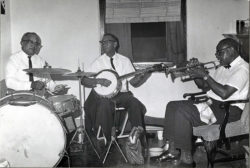Alex Bigard
Jazz drummer Alex Bigard had a successful career as a recording artist and musician in New Orleans for much of the twentieth century.

Courtesy of Tulane University, William Ransom Hogan Archive of New Orleans Jazz
Andy Anderson Band. Hurley, Jack (Photographer)
Alex Bigard, often called “Alec,” was a New Orleans early jazz and brass band drummer. Brother of jazz legend Albany Leon “Barney” Bigard—who was Duke Ellington’s clarinetist from 1928 to 1942—Alex Bigard was a lesser-known figure and historically overshadowed by his younger brother’s musical career. Nonetheless, he is remembered well for his much-emulated dance band drumming, for his role as leader of the Mighty Four—his own band with Lionel Ferbos, George Guesnon, and Harold Dejan—and for his acclaimed recordings for the Folkways, Icon, and Mono record labels.
Alex Bigard was born in New Orleans on September 25, 1898. His musically talented family included, among others, brothers Barney and Sidney, uncle Emile Bigard, and cousins Natty Dominique and A. J. Piron. Bigard began performing publicly at an early age. Growing up, he joined his brothers in a performance trio; later he received more formal musical training from the great jazz drummer Louis Cottrell Sr. He then was able to begin serving as a replacement player for some of the most popular New Orleans bands of the era, including the Maple Leaf Orchestra with Manuel Perez and Alphonse Picou, and cousin A. J. Piron’s New Orleans Orchestra in 1917. During this time Bigard also performed with a quartet at numerous landmark New Orleans venues, including Tom Anderson’s cabaret and the Hummingbird Cabaret. By the mid-1920s, Bigard had joined Sidney Desvigne’s orchestra, in which his uncle, Emile, played violin. A pit musician at the Lyric Theater for a time under John Robichaux’s leadership, Bigard stayed with that group until Robichaux’s death in 1939.
Like countless other musicians, Bigard had to supplement his earnings from music with numerous odd jobs, and little is known about his public music performance during many periods in his life. In the 1940s Bigard performed with the trumpeter Henry “Kid” Rena. The 1950s saw Bigard as a member of Leonard Bechet’s Silver Bell Orchestra. He also founded the Mighty Four, his own group with Lionel Ferbos, George Guesnon, and Harold Dejan, which played at the Melody Inn and, later, the Harmony dance hall. Bigard’s talents as a dance band drummer are well noted in jazz studies as being influential in both dance and percussion circles.
The 1960s proved to be one of the most productive musical periods of Bigard’s life, as the decade found him playing with Harold Dejan, Billie and DeDe Pierce, and “Creole” George Guesnon. Bigard left behind a number of important recordings, among them a session with Kid Clayton’s band on Folkways Records in 1951, one with Punch Miller’s band on the Icon label in 1960, and another with Kid Sheik Colar on the Mono recording label in 1961. Bigard retired from public performance in 1967. He died in New Orleans on June 27, 1978.
